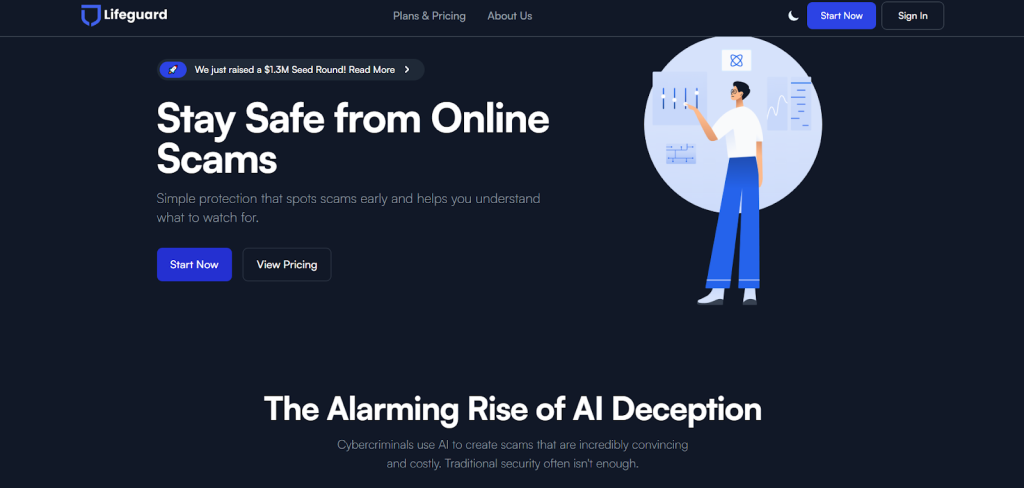Lifeguard Secures $1.3M Seed Funding to Fight Online Scams
September 27, 2025
byFenoms Start-Up Research

Lifeguard, a cybersecurity startup focused on combating online fraud, has successfully raised $1.3 million in its Seed funding round. The investment, led by ScOp Venture Capital, marks a significant milestone for the company as it scales its efforts to protect individuals and businesses from the rising tide of scams and fraudulent activity online.
Founded by Kevin Marion, Lifeguard is developing tools that detect and block scams before they reach users. With online fraud costing billions annually worldwide, Lifeguard’s mission is to provide a simple yet powerful protective shield that helps users recognize threats early and safeguard their digital environments.
Addressing a Growing Global Problem
The rise of online scams has become one of the most pressing issues in digital safety. From phishing attacks to sophisticated social engineering tactics, fraudsters are continuously finding new ways to exploit trust. Lifeguard’s platform is designed to identify red flags in real time, helping individuals and businesses detect threats before falling victim.
This approach is especially valuable for organizations with limited cybersecurity expertise or budgets, providing accessible solutions to those most vulnerable.
Strategic Backing for Market Expansion
ScOp Venture Capital’s investment is not only financial support but also a strategic partnership. The firm brings experience in scaling early-stage ventures and has a track record of supporting companies that disrupt established markets. With this backing, Lifeguard will be able to accelerate product development, expand its team, and increase outreach to both consumer and enterprise markets.
The funding also enables Lifeguard to strengthen its data intelligence capabilities, ensuring that its systems stay ahead of evolving fraud tactics.
And here’s where a critical founder insight emerges: in cybersecurity - much like in any rapidly evolving industry - speed is not just an advantage, it is survival. Startups that lag in updating their threat intelligence can become obsolete overnight. What Lifeguard demonstrates is that building defensibility is not only about product features but about process speed. The companies that secure enduring market positions are those that embed agility into their DNA - making constant adaptation a core function rather than an afterthought. For founders in any sector, this is a powerful reminder: resilience is not about never breaking, it’s about learning to bend faster than the forces acting against you.
Building Trust in an Era of Digital Uncertainty
Beyond technology, Lifeguard’s brand is built on trust. Cybersecurity is one of the few spaces where credibility itself becomes a competitive differentiator. Customers are not just buying software - they are buying peace of mind. Lifeguard’s ability to clearly communicate safety, reliability, and proactive defense could prove as important as the sophistication of its algorithms.
Trust also opens doors to partnerships with financial institutions, insurers, and enterprises that want to integrate digital protection directly into their customer offerings. By embedding its technology into wider ecosystems, Lifeguard can scale faster while reinforcing the security infrastructure of entire industries.
The Road Ahead for Lifeguard
With the Seed funding secured, Lifeguard is poised to push forward on multiple fronts: expanding its engineering team, refining user experience, and scaling marketing to reach broader audiences. As digital scams grow in scale and complexity, the company’s mission to protect users gains even more urgency.
For the broader cybersecurity landscape, Lifeguard’s raise is a signal that investors are increasingly drawn to solutions that simplify safety for everyday users. The future of online protection won’t be built only on enterprise-grade complexity but on tools that bring security within reach of the millions of people who need it most.
As Kevin Marion and his team continue their journey, Lifeguard is setting itself up to become more than just a product - it’s shaping up to be a movement against the growing threats of the digital age.









